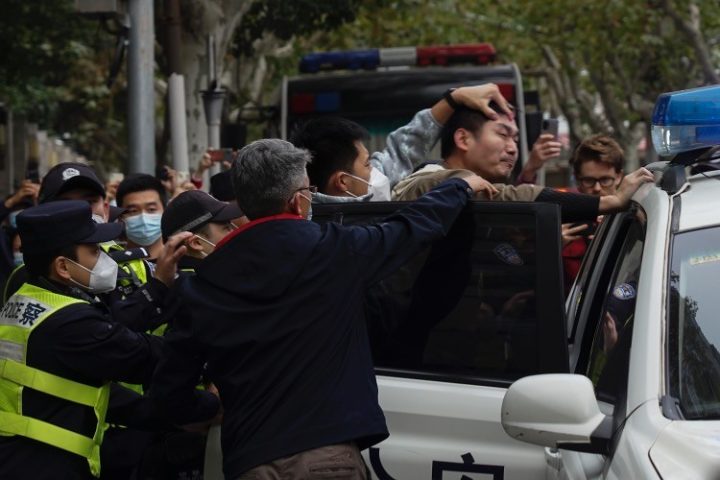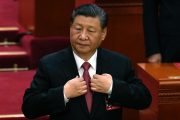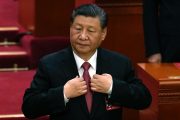
Chinese authorities have begun investigating some of the people who convened at last weekend’s protests against Covid-19 restrictions, according to three people who were at the Beijing demonstrations, as authorities police the city’s streets.
In one case, a caller who wanted to be known as a Beijing-based police officer requested for the protester to come to a police station on Tuesday to present a written record of Sunday night’s events.
Additionally, a college also contacted a student allegedly involved in the protests, asking the student to provide a written account of the activities that transpired at the protests.
“We are all desperately deleting our chat history,” admitted one Beijing protester who wished to remain anonymous.
“There are just too many police officers. Police came to check the ID of one of my friends and then took her away. We don’t know why. A few hours later they released her.”
Beijing’s Public Security Bureau did not immediately respond to a media request for comment.
Police were patrolling areas in Shanghai and Beijing, where some groups on the Telegram messaging service had indicated that people would convene again for more protests. The police presence on Monday evening and Monday night prevented any gatherings from taking place.
“The large number of police, it’s really scary,” revealed Beijing resident Philip Qin, 22, a witness at the protests on Sunday.
Residents divulged that police have been stopping people passing through those areas and asking for their phones to investigate if they had virtual private networks (VPNs) and the Telegram app. VPNs are illegal for most people in China, while Telegram is banned from China’s internet.
Police also took away a busload of demonstrators during Sunday night protests in Shanghai.
Unverified videos on social media depicted hundreds of police at a large square on Monday night attempting to stop people from congregating in Hangzhou, the capital of the eastern province of Zhejiang. One video showcased police, encompassed by a small crowd of people holding smartphones, attempting to arrest someone, while others tried to prevent the detention from happening.
Just like their Beijing counterparts, the Hangzhou police authorities did not immediately reply to a media request for comment.
Likewise, in Sichuan province, teachers have asked students from several colleges, who participated in campus memorials for the victims, who the main organizer was, according to a person who attended one in Chengdu, the province’s capital.
Growing unhappiness with China’s draconian Covid-19 restrictions over the past three years has sparked off nationwide protests in cities thousands of miles apart over the weekend.
The weekend protests were Chinese citizens’ largest display of civil disobedience since Xi Jinping assumed the reins of government a decade ago, amid new lockdowns imposed on several cities. Demonstrations took place across around 15 Chinese cities — including the capital Beijing and financial hub Shanghai.
A fire last week in the western city of Urumqi, which authorities claimed killed 10 people, seems to have been the catalyst for various protests in other cities.
Some internet users claimed that China’s strict Covid-19 lockdown measures obstructed efforts to rescue people trapped in the burning building. These claims were denied by Chinese authorities.
Among the thousands of protesters, hundreds have even urged for the resignation of Chinese leader Xi Jinping. Under Xi’s leadership, China has seen endless mass-testing, abrupt lockdowns, enforced quarantine, digital tracking with a huge human and economic cost, all under the pretext of defeating Covid-19.
For example, a large group in Shanghai began shouting “Down with the Chinese Communist Party, down with Xi Jinping,” in an unprecedented public protest against Xi’s leadership.
Hundreds in Shanghai convened at a candlelight vigil on Urumqi Road, named after the Xinjiang city, to mourn the fire victims. Many displayed blank sheets of white paper — a symbolic protest against communist censorship — and chanted, “Need human rights, need freedom.”
Protesters also sang The Internationale, a socialist anthem used in demonstrations worldwide for more than a hundred years. Protesters also sung this anthem in Tiananmen Square in Beijing before a savage crackdown by communist troops in 1989.
Shanghai residents have borne a huge burden under China’s zero-Covid policies. A two-month lockdown earlier this year resulted in many being denied access to food, medical care, or other basic supplies, fostering massive public resentment.
Notwithstanding efforts to prevent Covid-19 transmission via this zero-Covid policy of eliminating all outbreaks and regulating tight border controls, China has seen a rise in Covid-19 cases.
Meanwhile, the regular, abrupt, and strict lockdowns have worsened one of the steepest slowdowns in economic growth that China has weathered in years. This economic slowdown in the world’s major economy has upended global supply chains and financial markets.
Not everyone was in favor of the nationwide protests, though.
Eminent nationalist bloggers with millions of followers, such as Ren Yi, the grandson of Communist Party leader Ren Zhongyi, and Yu Li, who uses the pen name of Sima Nan, insinuated this week that the protests were provoked by “foreign forces.”
“What is their purpose? On one hand it is to intensify internal conflicts. On the other hand, it is to see if they can completely politicize the issues around our epidemic prevention and health policies,” Ren penned in his “Chairman Rabbit” blog.
Chinese authorities typically caution against “foreign forces” undermining national security and have accused them of fomenting the 2019 pro-democracy Hong Kong protests.
“Blaming it on foreign forces is a standard tactic,” said Associate Professor Alfred Wu at the Lee Kuan Yew School of Public Policy. “This is how the party shirks responsibility and rallies people behind it.”
Proponents of China’s restrictive Covid-19 policies claim that these lockdowns have kept the death toll in the thousands, avoiding the millions of deaths elsewhere. They claim that loosening the policy could cause a rise in illness and deaths, overwhelming hospitals. Instead, proponents of Xi’s Covid rules strongly advocate vaccinating China’s elderly before the country can even think of reopening.
In a Tuesday editorial that conveniently omitted any mention of the protests, the People’s Daily, the Communist Party’s official newspaper, encouraged citizens to “unswervingly implement” Zero Covid policies, which put people’s “lives first,” claiming victory would arrive via “perseverance through thousands of hardships.” “The harder it is, the more you have to grit your teeth,” it said.



